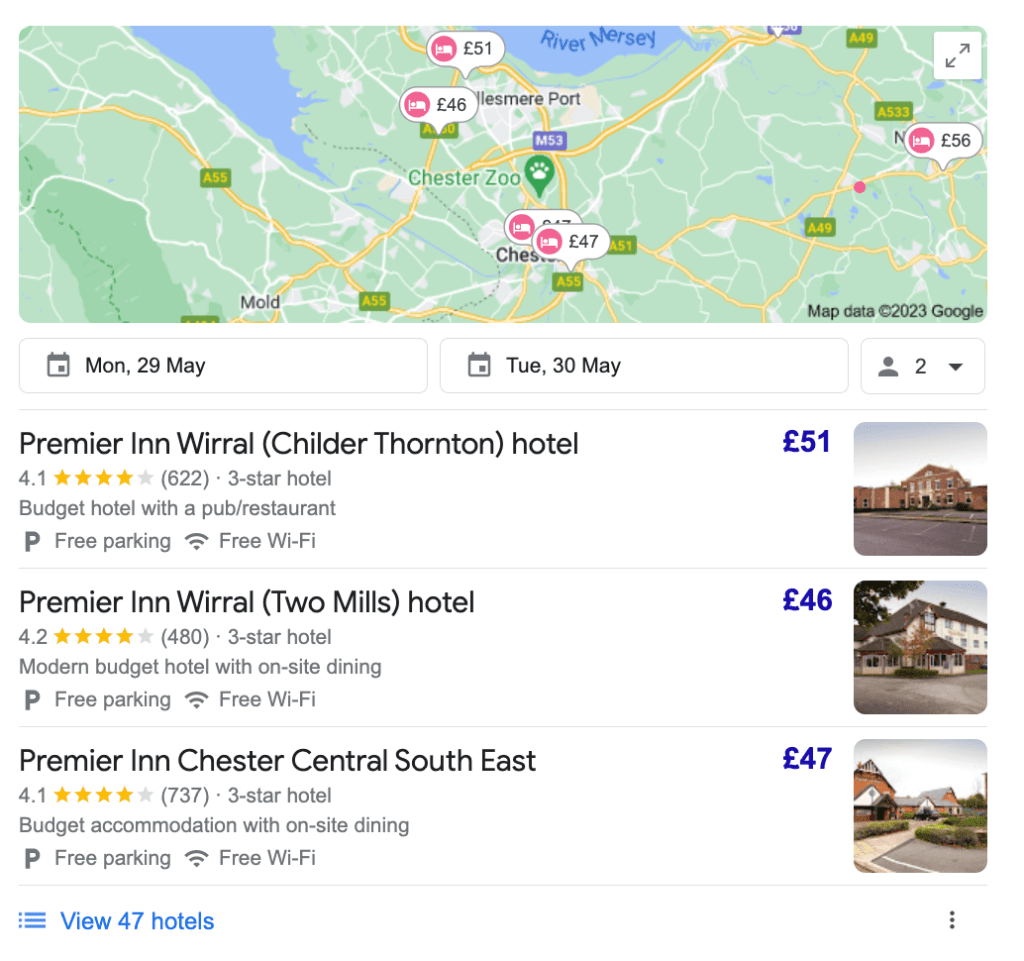The Ultimate Guide to Local SEO for Hotels
- May 16, 2023

With so much competition online, it can be tough to stand out in the hotel market. However, local SEO (Search Engine Optimisation) can help you get more guests through the door and REDUCE the number of bookings through sites like Booking.com that charge high commission fees.
In this guide, we’ll cover everything you need to know about local SEO for hotels, from understanding the key factors that impact local search rankings to implementing a local SEO strategy for your hotel.
Whether you’re new to local SEO or looking to take your hotel business to the next level, this guide is the ultimate resource for hotel owners who wish to succeed.
Understanding Local SEO
Local SEO is the process of optimising your website and online presence to rank higher in local search results. This process is crucial for hotels since many travellers search for accommodation near the destination they’re visiting. If your website is optimised, your business stands a better chance of popping up in their search engine results, making it easier for them to find you!
Google looks at various factors to determine which results to show, i.e. the businesses and services to display on a SERP (Search Engine Results Page).
Google’s search engine will look at the following:
1. Relevance: How relevant is your hotel to the user’s search query? This includes your hotel’s name, category, and website content.
2. Distance: How far is your hotel from the user’s location? Google uses geolocation data to determine the user’s location and show nearby results.
3. Prominence: How well-known is your hotel in the local area? This includes factors like the number of reviews, your hotel’s ratings and how many other websites link to your hotel’s website.
Thankfully, there are things you can do to ensure your hotel’s website is meeting Google’s expectations.
Implementing Local SEO for Hotels
You need to focus on several key areas to improve your hotel’s local SEO and meet Google’s requirements. These are as follows:
Google Business Profile
Formerly Google My Business, Google Business Profile (GBP) listing is one of the most critical aspects of local SEO success. It’s essentially a profile for your hotel that appears in Google search results and Google Maps.
Your GBP listing must include accurate and up-to-date information about your hotel, such as your address, phone number, website URL, and business hours. This is all helpful information for people seeking a hotel, making it easier for them to find you, get in touch, and book a room!

Local citations and directories
Local citations are references to your hotel’s name, address, and phone number (NAP) on other websites. These citations help establish your hotel’s online credibility and authority.
You can build local citations by submitting your hotel’s information to online directories like Yelp, TripAdvisor, and Yellow Pages.
Reviews and ratings
Online reviews and ratings are key factors in local search rankings. The more positive reviews and high ratings your hotel has, the higher it will rank in local search results.
You can build up your reviews by encouraging guests to leave feedback on your GMB listing and other online review sites.
People are more likely to choose to stay at your hotel if you have plenty of positive reviews! If you receive any negative reviews you should respond to them with a positive comment addressing the concerns.
On-page optimisation
On-page optimisation refers to optimising your hotel’s website content so that it’s search engine friendly. On-page optimisation includes improving and revising your website’s title tags, meta descriptions, and header tags to include trending local keywords and phrases.
Local link building
Building links from other local websites to your hotel’s website can improve your hotel’s position in local search results.
The best way to build local links is by contacting local websites, for example, popular tourist websites and offering to exchange links with them or by creating interesting local content to which other websites want to link.
Social media
Social media can help improve your hotel’s online visibility by building informal connections with individuals and potential customers.
Ensure you create profiles on social media platforms like Facebook, Instagram, and Twitter, to reach a broader and more diverse audience and post regular updates that include local keywords and hashtags.
Advanced Local SEO Strategies for Hotels
Advanced local SEO strategies can help hotels stand out in a crowded marketplace. Here are some strategies to consider:
-
Schema markup
This is the process of converting unstructured data to structured data, which helps search engines better understand the content on your website.
Implementing schema markup for your hotel’s address, phone number, and other important information, such as FAQs, will uncover featured snippet opportunities, boosting your visibility on Google.
-
Local content marketing
Creating content that targets local keywords and phrases can help attract more guests to your hotel. This can include blog posts, videos, and social media updates that showcase your hotel’s amenities and local attractions.
-
Mobile optimisation
With more and more people using mobile devices to search for local businesses, it’s essential to have a mobile-friendly website. This means ensuring your website is fast, easy to navigate, and optimised for smaller screens.
-
Voice search optimisation
As voice search becomes more popular, optimising your hotel’s website for voice queries is important. This can include using natural language in your content and targeting long-tail keywords (i.e. short phrases) which are more likely to be used in voice searches.
When implementing these strategies, it’s important to remember that they require ongoing effort and maintenance. Here are some tips for implementing these strategies effectively:
-Use a tool like Google’s Structured Data Markup Helper to implement schema markup on your website.
-Conduct keyword research using an SEO tool like SEMrush to identify local keywords and phrases to include within your content.
-Use Google’s Mobile-Friendly Test to optimise your website for mobile devices.
Tracking Your Local SEO for Hotels
To track and measure the success of your local SEO efforts, you can use tools like Google Analytics, Google Search Console, and Moz Local. These tools can help you monitor website traffic, search rankings, and local citations.
Conclusion
Local SEO is crucial to any hotel’s digital marketing strategy. By implementing the steps outlined in this guide, a hotel can improve its visibility in local search results, attract more guests, and increase revenue.
Remember to claim and verify your Google Business Profile listing, submit your hotel’s information to online directories, encourage guest reviews, optimise your website for local search, build local links, and create social media profiles.
Additionally, advanced strategies like schema markup, local content marketing, mobile optimisation, and voice search optimisation can help your hotel stand out from the crowd
With the right local SEO strategy, hotels can reach their target audience and drive more bookings. Why not contact Fly High Media today to see what we can do for you?
Looking for help with Local SEO? Contact Fly High Media.
Contact Us
Cheshire (Head Office)
Manchester
Get in touch
Let’s find the best solution for your business




